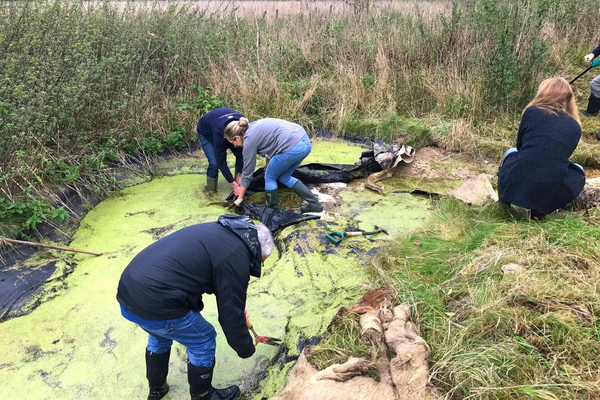
Operations Manager
22nd June 2020 (Updated 17th March 2021)
We have been keen supporters of AITO’s Project PROTECT (which stands for People, Resources, Outreach, Tourism, Environment, Conservation and Tomorrow) since its inception in 2017. This programme encourages and supports us, as a tour operator, to protect and look after the destinations in which we work; something that has, indeed, always been at the heart of our ethos since the very early days of Naturetrek. Each year we make a new pledge, and over the last couple of years we’ve focused our efforts on fundraising for Butterfly Conservation and increasing the donations to our cloudforest reserve in the Ecuadorian Andes. In order to fund our land purchases in Ecuador, we set aside £15 out of our own profits for every person booking on a long-haul holiday and £5 for those booking a short-haul tour. As of October 2020 we had donated £411,900 in this way, and our reserve reached 1,629 acres in size. The area saved included a large block of forest in the corridor, and an additional block of forest connecting the Llanganates National Park with a different kind of lower-elevation forest. Another £40,000 donation is due for 2021, and we are already working on our next land purchases for the reserve.
Over the years we have also donated over £200,000 to Butterfly Conservation to help ensure that vital butterfly habitats are protected across the UK and Europe.
While our work in Ecuador and with Butterfly Conservation continues, in 2020, during a very uncertain year for travel, we decided to focus our specific AITO pledge on a project close to home. The Naturetrek office is set amongst 12 acres of grassland, formally used for livestock grazing, and years of agricultural activities have reduced the site’s ecological value. Last spring, we pledged to enhance our site for wildlife, rebalancing nature in the grounds around our offices. This has developed into an exciting and valuable project, which we are continuing to implement and expand upon in 2021. We have begun to restore and enhance existing habitats, as well as introducing new, complimentary ones. These will strengthen existing wildlife populations, and hopefully encourage the arrival of a broader diversity of species. We are also undertaking considered planting to enhance our site as a carbon sink, offsetting some of our in-house carbon emissions.
Stage 1
The first stage of our rewilding plans involved a thorough overhaul of an existing pond, which had been in situ for many years and was in poor condition, offering very limited value to wildlife. The liner had become damaged, resulting in minimal water retention, and the remaining water had become heavily silted, lacking oxygen. There was no sign of life within the pond, and the surrounding grass had begun encroaching. During the spring of 2020, we sensitively emptied the pond and removed the liner. Then came an exciting day where, with the help of a digger, we expanded the pond’s footprint, creating varying depths and scalloped edges to create a range of microclimates for different species! We also created a south-facing ‘butterfly bank’ with some of the excavated materials, capping it with chalk ready for seeding with chalk downland wildflowers, as well as some log piles to provide nooks and crannies for wildlife. We added new underlining and liner, and then waited patiently for the rain to come! Whilst we had the digger on site, we also uncovered a section of chalk in our field, which we are now monitoring for the arrival of native chalk grassland species – watch this space, hopefully this spring will bring some good news!

Stage 2
Our pond is now full, and in the coming weeks we will tidy up the edges, creating a bog garden at the same time, and then seed the surroundings with a suitable, native wildflower mix. We are hoping that by spring our new pond will be a veritable wildlife haven! Shortly, we will also be planting a mixed, native species hedgerow around our pond and orchard. This will strengthen landscape connectivity through our land, as well as providing additional habitat for a range of species on site. Plant species have been chosen due to their value to wildlife, including a high percentage of Blackthorn. Last year, we once again recorded Brown Hairstreaks along hedgerows near our office – this species lays its eggs on young Blackthorn shoots, and we hope to encourage the expansion of this exciting local population! A new Barn Owl box has also been installed, with hopes of attracting the local population to breed on site – our resident Barn Owl has returned to hunt our field again this spring, so we are feeling optimistic.

Now, and onwards...
Later this year, we will also undertake a full ecological review of the site, using the results to inform the next phase of our rewilding plan. Amongst our surveys, we will be searching for reptiles, Hazel Dormouse, bats, birds and butterflies, as well as continuing our ever-popular monthly moth traps. The next phase may include expanding our existing scrub habitat via additional planting, implementing an informed management scheme to enhance the value of our expanse of grassland, planting more oak, elm and blackthorn for the three local Hairstreak species, and creating a ‘bat garden’, with evening-scented plant species to attract invertebrates as a foraging resource.
Those of us lucky enough to work in this beautiful corner of Hampshire love getting out for a wildlife walk at lunchtime, and we know that this project will not only enhance the area for local wildlife, but will also work wonders for our own physical and mental wellbeing. Once our monthly Open Days restart, we will look forward to taking those of you who can join us in Chawton out to explore our site, and to perhaps share a few rewilding tips from our in-house experts!

We would love to share our ideas, and to hear yours, and perhaps by working together in this way we will be able to gradually build a network of amazing wildlife opportunities across the country.
Further information about Project PROTECT and our past pledges can be found on the AITO website: https://www.aito.com/naturetrek/sustainable-travel#sustProject_140



 Loading search...
Loading search...